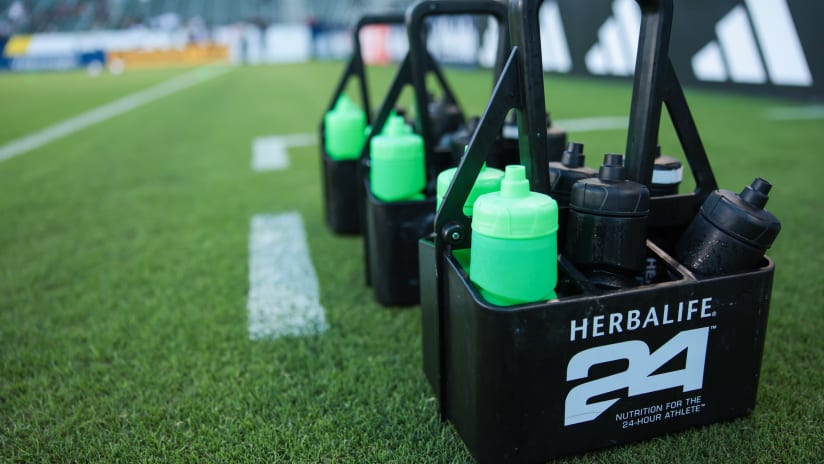Herbalife is the sports nutrition and presenting partner for the LA Galaxy. Herbalife Dietitians work closely with the LA Galaxy technical staff to make sure we are maximizing their nutrition to support performance goals.
Nutrition for Female Athletes
There are high energy demands for soccer players due to rigorous training schedules and the nature of the game itself consisting of up to (and sometimes beyond) 90 minutes of movement. Knowing the basics of how to build a training plate is key for female athletes to prevent deficiencies and optimize performance and health on and off the field.
Carbohydrates
Carbs are the body’s preferred source of energy and should be the major component of any athlete’s diet, eaten with every meal and snack.
Eating easy-digesting carbs before training can provide the body with quick energy and essential fuel to get you through the workout. Look for something low in fiber to avoid gastrointestinal discomfort during physical activity. Good quick-fueling carbohydrate options to eat within an hour of training/games include:
- Applesauce
- Banana
- Crackers
- Fruit leather, dried fruit
- Fruit juice
- Pretzels
- Sports drinks
When training for over an hour or when playing a soccer game, it is also essential to fuel with the carb sources listed above during activity. This helps supply your muscles with quick fuel to maintain energy levels and support athletic performance.
At main meals, it is important to refuel the body with complex carbohydrates that are rich in fiber to promote sustained energy and overall health. Women should aim for a minimum of 25g of fiber per day, spaced throughout the day. Good complex carbohydrate sources include:
- Whole grains (whole wheat bread/pasta, brown rice, oatmeal, quinoa)
- Berries, citrus, and other fruit
- Broccoli, carrots, and other vegetables
- Potatoes with the skin
- Beans and lentils
- Nuts and seeds
Finally, focus on adding a range of colors (fruits and vegetables) to every meal, as this will increase the variety of inflammation-fighting phytonutrients that you consume.
Protein
All athletes know how crucial protein is for muscle growth, but it is also important to understand that protein is also essential for muscle contraction, repair and recovery, immune function, and much more.
Spacing protein consumption throughout the day (including a bedtime snack) provides your body with a steady supply of amino acids to help promote muscle growth and prevent muscle breakdown. This can be done by consuming protein-rich foods, including:
- Eggs
- Greek yogurt
- Cottage cheese
- Edamame, tofu, soymilk
- Beans and lentils
- Nuts and seeds
- Lean cuts of meat, poultry, fish, and shellfish
- Protein powders
- Collagen (especially before training/games, consumed with a source of vitamin C to increase absorption)
A good rule of thumb for female athletes is to consume ~30 grams of protein at each main meal and ~15-20g of protein with each snack. Individualized goals including protein targets should be outlined with the help of a Sports Performance Dietitian.
In the next blog article, we will cover fat, micronutrients, and hydration for the female athlete.
References
1. Thomas DT, Erdman KA, Burke LM. Position of the academy of nutrition and dietetics, dietitians of Canada, and the American college of sports medicine: Nutrition and athletic performance. J Acad Nutr Diet. 2016;116(3):501-528. doi:10.1016/j.jand.2015.12.006




